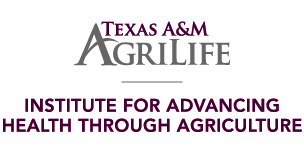Texas A&M AgriLife institute awards $1.5 million for diet-related research
Researchers concentrating on advancing health through agriculture
An award of $1.5 million to 15 new associate members of the Texas A&M AgriLife Institute for Advancing Health Through Agriculture, IHA, will support the new members’ research on responsive agriculture, precision nutrition, and social and behavioral healthy living to improve public health.
This marks the first time that IHA has issued such awards.
“The epidemic of diet-related chronic disease in Texas and nationally is costing lives and trillions of dollars each year,” said Patrick Stover, Ph.D., director of the IHA. “By funding associate members at the IHA, we’re able to advance research that addresses this challenge.”
“The research we’re funding now also aims to ensure that solutions for reducing diet-related chronic disease will support the environment and are economically viable for producers,” Stover said.
IHA associate members are made up of Texas A&M AgriLife faculty and scientists who devote at least 25% of their research effort to supporting the mission and vision of the IHA. With the addition of 15 associate members, the IHA is burnishing its mission to advance research and associated technologies. The work is designed to accelerate knowledge and practice, and to inform science-based policy and interventions that connect and enhance human, environmental and economic health, resiliency, sustainability and prosperity across the agriculture-food-health value chain.
Advancing technology and science
The recently funded IHA member researchers are exploring new technologies and areas of science. For example, one area of research is the use of Raman-based sensing, a non-invasive and non-destructive technique that can be used to detect and identify metabolism diseases and aging processes in humans, as well as assess the nutritional composition of seeds and fruits.
Another funded initiative is exploring whether the hormone ghrelin, previously and most notably assessed in animal models, is applicable to the study of humans, and to determine whether ghrelin is a good biomarker of aging and the inflammation associated with aging.
Within social and behavioral research, scientists are studying the efficacy of nutritional interventions in lab and field settings to increase the consumption of fruits and vegetables and promote the adoption of lasting lifestyle changes with an emphasis on obesity and diabetes management.
These examples illustrate the breadth of topics investigated throughout the IHA but only represent a handful of studies underway.
These researchers have been awarded funding:
- Joseph Awika, Ph.D., professor and department head, Department of Food Science and Technology, Bryan-College Station.
- Robert Chapkin, Ph.D., distinguished professor, Allen Endowed Chair in Nutrition and Chronic Disease Prevention, Regents Fellow and AgriLife Research Senior Faculty Fellow, Department of Nutrition, Bryan-College Station.
- Dmitry Kurouski, Ph.D., assistant professor, Department of Biochemistry and Biophysics, Bryan-College Station.
- Katie Lewis, Ph.D., soil chemistry and fertility researcher, Texas A&M AgriLife Research and the Department of Soil and Crop Sciences, Lubbock.
- Lexi MacMillan Uribe, Ph.D., registered dietitian, IHA and AgriLife Research, Dallas.
- Bruce McCarl, Ph.D., university distinguished professor, Department of Agricultural Economics, Bryan-College Station.
- Marco Palma, Ph.D., professor, Department of Agricultural Economics, director of the Human Behavior Laboratory, Bryan-College Station.
- Bhimu Patil, Ph.D., AgriLife Research Regent Professor, the Inaugural Leonard Pike University Professor and director of the Vegetable and Fruit Improvement Center, Department of Horticultural Sciences and U.S. Department of Agriculture National Center of Excellence on Melons at Texas A&M, Bryan-College Station.
- Chad Rethorst, Ph.D., associate professor, IHA and AgriLife Research, Dallas.
- Bill Rooney, Ph.D., professor and Borlaug-Monsanto Chair for Plant Breeding and International Crop Improvement, Department of Soil and Crop Sciences, Bryan-College Station.
- Yuxiang Sun, M.D., Ph.D., AgriLife Research, professor in the Department of Nutrition, Bryan-College Station.
- Jacob Szeszulski, Ph.D., assistant professor, IHA and AgriLife Research, Dallas.
- Matt Taylor, Ph.D., assistant professor of food microbiology, Department of Animal Science, Bryan-College Station.
- Jeff Tomberlin, Ph.D., professor, AgriLife Research Fellow and Presidential Impact Fellow, Department of Entomology, Bryan-College Station.
Advancing the IHA mission
In addition, the IHA has brought on more than 90 affiliate members. Affiliate members provide meaningful support to the mission and vision of IHA, such as strengthening technical capabilities and serving as co-investigators. Researchers may apply at any time to become affiliate members of the IHA.
The IHA, which includes the U.S. Department of Agriculture Agricultural Research Service, USDA-ARS, “Responsive Agricultural Food Systems Research Unit,” will work with other ARS units and land-grant universities nationally to bring big data, state-of-the-art sensors and computational systems approaches to responsive agriculture, precision nutrition and social and behavioral research.






